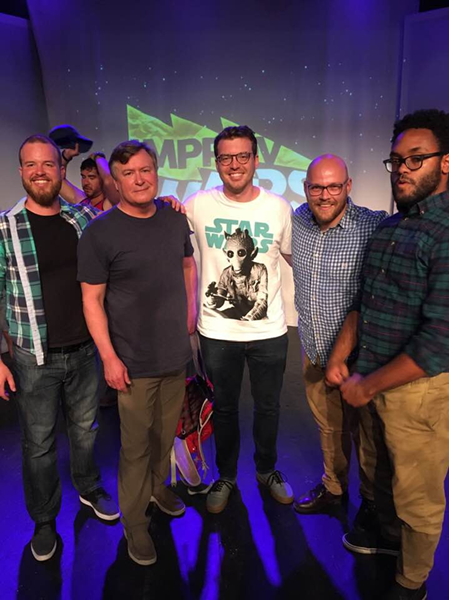APPAM’s Five Minutes with… series was introduced in March 2019 to illuminate the work of individual APPAM members, and promote connections between members based on their shared interests. The opportunity to be profiled on our website and social media through these interviews is an exclusive APPAM member benefit! We encourage those APPAM members interested in being interviewed to email [email protected].
Name:Rob Moore
Location: Columbus, Ohio
Place of Employ and Position: Scioto Analysis, Principal
Degrees, including Institutions: Master of Public Policy, University of California, Berkeley Goldman School of Public Policy; Bachelor of Arts, Denison University
E-mail Address: [email protected]
Professional Website: http://www.sciotoanalysis.com
1. What attracted you to the field?
I have always been a rather left-brain thinker, but have also been someone who has been passionate about social issues, poverty, and inequality. Policy analysis is a great place for people who have the engineering mindset but an interest in making society as a whole better.
More specifically, when I was an organizer for Planned Parenthood in Nebraska, we were involved with legislation to extend contraceptive coverage for Medicaid recipients on the state. We were surprised to see the bipartisan support the bill received after the state legislative research office produced an estimate of the state savings that would result from the bill. The bill ultimately failed by four votes after radical advocacy groups let a bitter campaign against it, but for such a bill to receive so much support in a conservative state such as Nebraska showed me the power of nonpartisan, dispassionate analysis in the political process.
2. You’ve studied and analyzed a variety of policy subjects including economic development, environment, education, and public health. Which is your favorite and why?
My training at the Goldman School of Public Policy outfitted me to be a generalist and I am very interested in analyzing policy’s impact on the economy, poverty and inequality, and general well-being broadly. That being said, I have a special heart for work on the social safety net. Both chronic and intermittent poverty are ills that impact a swath of the population in the United States and our safety net is so crucial to buttressing families in their most vulnerable moments. Analysis of the impact of safety net features on the size and character of the economy presents both an intellectual and moral challenge for both analysts and policymakers.
3. You are the Principal of an organization called Scioto Analysis. What inspired you to create this company and what do you do there?
One thing I found when I moved back to Ohio in 2017 was that cost-benefit analysis was nearly nonexistent at the state level. In general, policy decisions in Ohio are driven more by interest groups than dispassionate analysis. In a democracy, interest groups and public opinion have a role, but good policy requires political interests to be balanced with facts about the impacts of policy. Scioto Analysis is a firm that provides these facts to policymakers who want them and promotes better analysis at the state and local level
4. Grassroots and community organizing seems to be important to you. Why is grassroots organizing important for public policy research and analysis?
Before becoming an analyst, I was an organizer in Omaha, Nebraska. My experience organizing neighborhoods in Omaha and public health advocates throughout the state has given me an on-the-ground perspective to balance against the broader empirical evidence my policy analysis training taught me to collect. Ultimately, analysts and organizers are part of the same ecosystem: analysts need to determine the effectiveness, efficiency, and equity of policy interventions and organizers need to rally people behind those policies that do best on these dimensions.
5. If you could give one piece of advice to young people considering policy analysis as a career, what would it be?
Study economics! Ultimately, the project of policy analysis is one of the maximization of public resources. Economics is the systematic study of scarcity and if resources aren’t scarce, there is no role for the analyst. Intro to microeconomics can seem like a drag, but once you start internalizing the lessons of economics, you start seeing how they can be applied to a host of policy problems and how they can help policymakers squeeze more out of the resources we have now.
6. How has the career of public policy changed in the last five years? Where do you see the field going in the future?
Interest in questions of equity is on the rise. We are in the largest expansionary period in the history of the United States but inequality continues to worsen and certain populations and regions remain stagnant in the face of it. More researchers and policymakers are interested in figuring out how to make growth inclusive so that equity and efficiency work hand and hand instead of at odds with one another.
Over the next thirty years or so, I expect public policy to improve its rigor and expand its insights in the fields of human development and well-being. If we can better understand how policies impact development metrics such as education, health, and housing and food security along with subjective assessment of well-being, we can craft policy that responds not only to the classical economic concept of getting people what they want but also to helping people live independent, fulfilling lives.
7. Outside of work, what do you do for fun?

My most time-consuming non-policy pursuit is as an improvisational comedian in the Columbus comedy community. I perform with a team called Slumberjacks doing longform improv comedy, meaning we make full improvised plays off the top of our heads using audience suggestions. Improv is a great way to both blow off steam and practice mindfulness when my everyday work is focused on anything but being “in the moment.”